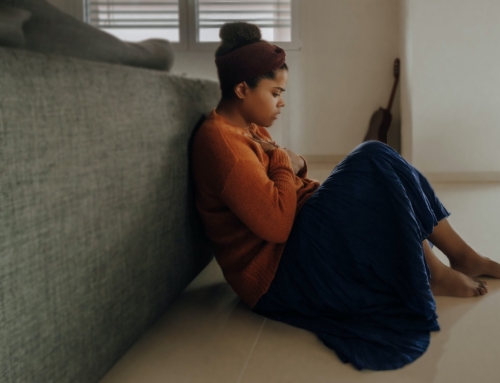Separation anxiety is recurrent stress that can make even anticipating the separation fraught with emotions. It can  create unhealthy habits of codependency and lead to attachment disorders. It is more than just missing a loved one; there can be deep worries and fears that rise up in times of separation.
create unhealthy habits of codependency and lead to attachment disorders. It is more than just missing a loved one; there can be deep worries and fears that rise up in times of separation.
For some people, they are not bothered by someone being out of sight and out of mind. For others, all unseen and unknown things can lead to debilitating anxiety for others. When someone you care about leaves the house, your thoughts may immediately run down the trail of horrible possibilities. News stories and social media will often feed those fears in an unhelpful way.
Separation anxiety in children.
Separation anxiety is not uncommon in young children, especially when they spend the entirety of their brief lives with a primary caregiver. The first time a baby is with a babysitter is a big milestone for parents and child. Separation anxiety becomes an issue when it is recurring, consistent, and happens in familiar environments.
It is normal for young children to be clingy when they are away from their primary caregiver. The transition to school can be rough on anxious children in particular. If a child is on an autistic spectrum, being upset when separated from mom and dad is common and more extreme. Learning to feel safe and comfortable in a new environment takes time.
Symptoms of separation anxiety.
Separation anxiety in your child may take many different forms, but some common ones include:
- clinging to parents.
- extreme and severe crying.
- refusal to do things that require separation.
- physical illness, such as headaches or vomiting.
- violent, emotional temper tantrums.
- refusal to go to school.
- poor school performance.
- failure to interact in a healthy manner with other children.
- refusing to sleep alone.
Tips to reduce separation anxiety.
 Talk to your child in a calm, positive tone so as not to feed into their anxiety.
Talk to your child in a calm, positive tone so as not to feed into their anxiety.- Practice separating for short periods of time. Go to the grocery store while they stay with another trusted adult.
- Make your goodbye short, since drawing it out makes things harder for everyone.
- Be consistent at drop-off times and pick-ups. When your anxious child knows he or she can rely on you to show up, it will instill confidence in him or her.
- Acknowledge your child’s fear, even if it is wildly irrational and impossible. It is deeply real for him or her, and you paying attention will reassure them.
- Praise your child when you see them actively face a fear and overcome it.
- Create a special goodbye ritual (a secret handshake, a prayer and hug, or a familiar phrase).
It will take time, repetition, and building trust to help your child feel comfortable when they are away from you. Try to determine the root of your child’s fear of separation by listening to their verbal and nonverbal cues. It will take time to get to the root of your child’s fears. Be patient as you help them through the process.
Having scheduled time together can help your child feel that they are loved and not be so anxious about separation. If you plan to cuddle with them before bed, have a weekly date, or just make time to talk to them it can go a long way to alleviating the anxiety around being apart from you.
Separation anxiety as a parent.
First time parents may find watching their child head through the double doors of school a major emotional experience. If you have spent the first several years of your child’s life in constant proximity to them, you may experience separation anxiety. It is important to celebrate the milestone with your child and not make them feel guilty for being away from you.
 Plan a warm welcome when you pick your child up. Know that they will have days that they are tired and cranky from being at school and days when they have nothing to say. Other times the stories about their day May flow like water. Learning how to let your child try things away from you can be challenging but is necessary for them to develop and grow.
Plan a warm welcome when you pick your child up. Know that they will have days that they are tired and cranky from being at school and days when they have nothing to say. Other times the stories about their day May flow like water. Learning how to let your child try things away from you can be challenging but is necessary for them to develop and grow.
Given many recent school shootings and the way that COVID-19 affected schooling, parents may be experiencing higher levels of separation anxiety. If you are feeling anxious about those issues, spend some time learning about the school’s safety policies and come up with plans for your family. There are no perfect solutions. Do your best to keep your anxieties to yourself, and not put them onto your child.
The God who does not separate from you.
Separation and return are normal parts of human experience. Depending on your experience, you may have dealt with abandonment or ghosting in your life. This can make it more difficult for you to trust people. But you can learn to trust God who does not separate from you.
Who shall separate us from the love of Christ? For I am convinced that neither death nor life, neither angels nor demons, neither the present nor the future, nor any powers, neither height nor depth, nor anything else in all creation, will be able to separate us from the love of God that is in Christ Jesus our Lord. – Romans 8:35, 38-39 (NIV)
It might be tempting to think that if you do the wrong thing God will abandon you. If you struggle with those kinds of thoughts then hold on to the promises from Romans. The omnipresence of God and the promised presence of the Holy Spirit can be of great comfort to you.
Perhaps the reason he was separated from you for a little while was that you might have him back forever. – Philemon 1:15 (NIV)
 Colloquial wisdom says that absence makes the heart grow fonder. Separation can add value to your life, giving you a chance to miss someone you care about. The joy of being reunited, even after a few hours of separation, is a wonderful experience.
Colloquial wisdom says that absence makes the heart grow fonder. Separation can add value to your life, giving you a chance to miss someone you care about. The joy of being reunited, even after a few hours of separation, is a wonderful experience.
No one will be able to stand against you all the days of your life. As I was with Moses, so I will be with you; I will never leave you nor forsake you. Be strong and courageous, because you will lead these people to inherit the land I swore to their ancestors to give them. – Joshua 1:5-6 (NIV)
The work of healthy relationships involves time together and time apart. Leaving and returning are normal parts of life and work, and learning to do them well in a relationship is important. When you seek God, he is there for you to grow in your relationship with him.
All this I have spoken while still with you. But the Advocate, the Holy Spirit, whom the Father will send in my name, will teach you all things and will remind you of everything I have said to you. Peace I leave with you; my peace I give you. I do not give to you as the world gives. Do not let your hearts be troubled and do not be afraid. – John 14:25-27 (NIV)
Jesus knew the fears that his disciples had about him leaving. So, he told them that they would not be alone. There is help for the ones who love Jesus and want to live a life that follows him.
Separation anxiety disorder and treatment.
There are times when anxiety is more than a phase on the child development charts. If you find that anxiety is preventing you from completing assignments or managing life, there may be more underlying than fear of being apart from those you love.
Seeking professional help from a counselor can lead you down a path of peace. Your counselor may use talk therapy as a way to find out what is underlying all of the anxiety you or your child may be facing.
“Church”, Courtesy of Nagesh Badu, Unsplash.com, CC0 License; “Praying”, Courtesy of Patrick Fore, Unsplash.com, CC0 License; “Sea”, Courtesy of Joseph Barrientos, Unsplash.com, CC0 License; “Waves”, Courtesy of Matt Hardy, Unsplash.com, CC0 License










